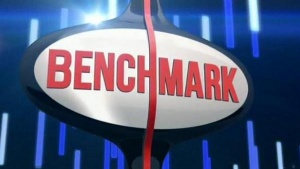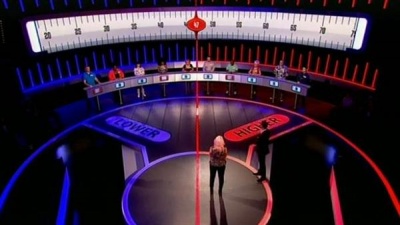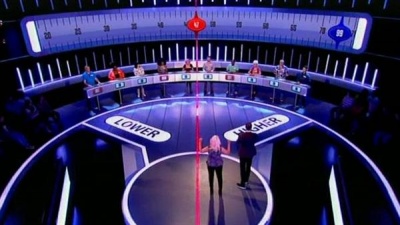Benchmark
(→Web links) |
(→Trivia) |
||
| Line 67: | Line 67: | ||
== Trivia == | == Trivia == | ||
| - | ''Benchmark'' badly underperformed in its original 4pm teatime spot; 150,000 viewers put it on a par with shows on CBBC. The show was taken off air after 9 episodes; the | + | ''Benchmark'' badly underperformed in its original 4pm teatime spot; 150,000 viewers put it on a par with shows on CBBC. The show was taken off air after 9 episodes; the show returned on 2 November at 1.10pm lunchtime before being taken off air again on 11 November. |
The celebrity specials originally aired in the big Saturday night primetime slot at 7pm, it gained a steady 546,000 viewers for the first episode until the second episode dropped to 288,000 viewers, when the third episode didn't fair any better with 362,000 viewers, Channel 4 burned the last two remaining celebrity specials in a Friday late night slot at 11.05pm. | The celebrity specials originally aired in the big Saturday night primetime slot at 7pm, it gained a steady 546,000 viewers for the first episode until the second episode dropped to 288,000 viewers, when the third episode didn't fair any better with 362,000 viewers, Channel 4 burned the last two remaining celebrity specials in a Friday late night slot at 11.05pm. | ||
Revision as of 03:38, 15 November 2015
Contents |
Host
Broadcast
Victory Television Scotland for Channel 4, 1 June 2015 to present
as Celebrity Benchmark, 26 September to 23 October 2015 (5 episodes in 1 series)
Synopsis
According to press notices:
- "A panel of 10 members of the public, the 'benchmarkers', answer a series of tricky numerical general knowledge questions. Their answers set the benchmark for the contestant to decide whether the correct answer is higher or lower for the chance to win thousands of pounds.
- "As well as helping, and hopefully not hindering the contestant, the benchmarkers are also in their own battle to be top of the leaderboard to play for cash on the next show. "
The top two players from yesterday's show are brought forward to answer a question, such as "What percentage of people believe they're of below-average intelligence?" Rather than just give the answer, host Paddy McGuinness asks the players to commentate and speculate on their responses. Already, we see it's going to be a chatty show.
Eventually, we find out which player is closer. That person will play for the money; the other returns to the Bench, and will be one of the ten Benchmarkers.
The bulk of Benchmark is taken up by similar questions. They can be fact-based questions ("what's the speed of the fastest sneeze?") or survey-based questions ("how many chickens are eaten each year in the UK?") Each time, the ten players behind the benches have given numerical answers to this question. The three least accurate answers have been discarded, and the remainder averaged to produce a benchmark.
While the player considers whether the real answer is higher or lower than the benchmark, Paddy identifies the three worst performers, exposes one or more of their answers, and chat to some of them. The conversation is part banter, and part Paddy berating them for being so stupid.
During this chatter, the player's been stood at the middle of the studio, straddling a red line. The player can step right, indicating the correct answer is "higher" than the benchmark, or step left for "lower".
A correct answer to the question allows the player to advance their rangefinder along a path. The range always covers three values, initially £50, £100, £250. The first right answer progresses to £100, £250, £500. The later values are £1000, £2000, £4000, £6000, then £10,000, £15,000 and a top prize of £25,000.
The show continues in this manner for half an hour. Paddy asks a question. Paddy banters with the players at the bench. Seven questions are asked. Seven decisions are made. From question five, only the three nearest answers are used to form the benchmark, and the player is required to double one answer: this will move their rangefinder two spaces rather than one.
For the final, the player faces three percentage questions. These questions are asked, and answers are locked in, before we find how accurate or otherwise they are. For each question, the player is required to ask someone from the bench, and they're obligated to give a precise integer answer.
The final countdown works like Cliffhanger from The Price is Right. Each part of the range is split into 33 segments, and one of those segments is ticked off for each 1% of error in the player's guess. So if the player suggests 35% of babies are given two or more middle names, and the actual answer is 11%, they're going to move down by 24 segments. Repeat for all three winners, hope to win some money, celebrate.
There's one final piece of business. Throughout the game, the benchmarkers have been ranked by the accuracy of their answers. The worst performer will leave the show. The two best will face tomorrow's head-to-head question. The remainder are trapped on the show, destined to spend their days with Paddy McGuinness until they win money, or lose badly, or go mad with boredom. On average, a player will spend five days there. The average player will spend much longer, because they won't win or lose.
Catchphrases
"The show where the answers are average, but nothing else is."
Inventor
Devised by Stuart Shawcross
Title Music
Music by Ken Bolam and Nick Foster
Trivia
Benchmark badly underperformed in its original 4pm teatime spot; 150,000 viewers put it on a par with shows on CBBC. The show was taken off air after 9 episodes; the show returned on 2 November at 1.10pm lunchtime before being taken off air again on 11 November.
The celebrity specials originally aired in the big Saturday night primetime slot at 7pm, it gained a steady 546,000 viewers for the first episode until the second episode dropped to 288,000 viewers, when the third episode didn't fair any better with 362,000 viewers, Channel 4 burned the last two remaining celebrity specials in a Friday late night slot at 11.05pm.
Web links
Discussion at Bother's Bar winkled out that – at least in the earliest episodes – the benchmarks tended to be too low, and were almost always too low when the question talked about thousands or more. Contributors also noted that the final round could be gamed by always picking 50%.




